- Home
- Patricia MacLachlan
Sarah, Plain and Tall Page 2
Sarah, Plain and Tall Read online
Page 2
“I’ll come, too!” cried Caleb. “Sarah said winter,” he said to me. “That means Sarah will stay.”
Together we picked flowers, paintbrush and clover and prairie violets. There were buds on the wild roses that climbed up the paddock fence.
“The roses will bloom in early summer,” I told Sarah. I looked to see if she knew what I was thinking. Summer was when the wedding would be. Might be. Sarah and Papa’s wedding.
We hung the flowers from the ceiling in little bunches. “I’ve never seen this before,” said Sarah. “What is it called?”
“Bride’s bonnet,” I told her.
Caleb smiled at the name.
“We don’t have this by the sea,” she said. “We have seaside goldenrod and wild asters and woolly ragwort.”
“Woolly ragwort!” Caleb whooped. He made up a song.
“Woolly ragwort all around,
Woolly ragwort on the ground,
Woolly ragwort grows and grows,
Woolly ragwort in your nose.”
Sarah and Papa laughed, and the dogs lifted their heads and thumped their tails against the wood floor. Seal sat on a kitchen chair and watched us with yellow eyes.
We ate Sarah’s stew, the late light coming through the windows. Papa had baked bread that was still warm from the fire.
“The stew is fine,” said Papa.
“Ayuh.” Sarah nodded. “The bread, too.”
“What does ‘ayuh’ mean?” asked Caleb.
“In Maine it means yes,” said Sarah. “Do you want more stew?”
“Ayuh,” said Caleb.
“Ayuh,” echoed my father.
After dinner Sarah told us about William. “He has a gray-and-white boat named Kittiwake.” She looked out the window. “That is a small gull found way off the shore where William fishes. There are three aunts who live near us. They wear silk dresses and no shoes. You would love them.”
“Ayuh,” said Caleb.
“Does your brother look like you?” I asked.
“Yes,” said Sarah. “He is plain and tall.”
At dusk Sarah cut Caleb’s hair on the front steps, gathering his curls and scattering them on the fence and ground. Seal batted some hair around the porch as the dogs watched.
“Why?” asked Caleb.
“For the birds,” said Sarah. “They will use it for their nests. Later we can look for nests of curls.”
“Sarah said ‘later,’” Caleb whispered to me as we spread his hair about. “Sarah will stay.”
Sarah cut Papa’s hair, too. No one else saw, but I found him behind the barn, tossing the pieces of hair into the wind for the birds.
Sarah brushed my hair and tied it up in back with a rose velvet ribbon she had brought from Maine. She brushed hers long and free and tied it back, too, and we stood side by side looking into the mirror. I looked taller, like Sarah, and fair and thin. And with my hair pulled back I looked a little like her daughter. Sarah’s daughter.
And then it was time for singing.
Sarah sang us a song we had never heard before as we sat on the porch, insects buzzing in the dark, the rustle of cows in the grasses. It was called “Sumer Is Icumen in,” and she taught it to us all, even Papa, who sang as if he had never stopped singing.
“Sumer is icumen in,
Lhude sing cuccu!”
“What is sumer?” asked Caleb. He said it “soomer,” the way Sarah had said it.
“Summer,” said Papa and Sarah at the same time. Caleb and I looked at each other. Summer was coming.
“Tomorrow,” said Sarah, “I want to see the sheep. You know, I’ve never touched one.”
“Never?” Caleb sat up.
“Never,” said Sarah. She smiled and leaned back in her chair. “But I’ve touched seals. Real seals. They are cool and slippery and they slide through the water like fish. They can cry and sing. And sometimes they bark, a little like dogs.”
Sarah barked like a seal. And Lottie and Nick came running from the barn to jump up on Sarah and lick her face and make her laugh. Sarah stroked them and scratched their ears and it was quiet again.
“I wish I could touch a seal right now,” said Caleb, his voice soft in the night.
“So do I,” said Sarah. She sighed, then she began to sing the summer song again. Far off in a field, a meadowlark sang, too.
5
The sheep made Sarah smile. She sank her fingers into their thick, coarse wool. She talked to them, running with the lambs, letting them suck on her fingers. She named them after her favorite aunts, Harriet and Mattie and Lou. She lay down in the field beside them and sang “Sumer Is Icumen in,” her voice drifting over the meadow grasses, carried by the wind.
She cried when we found a lamb that had died, and she shouted and shook her fist at the turkey buzzards that came from nowhere to eat it. She would not let Caleb or me come near. And that night, Papa went with a shovel to bury the sheep and a lantern to bring Sarah back. She sat on the porch alone. Nick crept up to lean against her knees.
After dinner, Sarah drew pictures to send home to Maine. She began a charcoal drawing of the fields, rolling like the sea rolled. She drew a sheep whose ears were too big. And she drew a windmill.
“Windmill was my first word,” said Caleb. “Papa told me so.”
“Mine was flower,” I said. “What was yours, Sarah?”
“Dune,” said Sarah.
“Dune?” Caleb looked up.
“In Maine,” said Sarah, “there are rock cliffs that rise up at the edge of the sea. And there are hills covered with pine and spruce trees, green with needles. But William and I found a sand dune all our own. It was soft and sparkling with bits of mica, and when we were little we would slide down the dune into the water.”
Caleb looked out the window.
“We have no dunes here,” he said.
Papa stood up.
“Yes we do,” he said. He took the lantern and went out the door to the barn.
“We do?” Caleb called after him.
He ran ahead, Sarah and I following, the dogs close behind.
Next to the barn was Papa’s mound of hay for bedding, nearly as tall as the barn, covered with canvas to keep the rain from rotting it. Papa carried the wooden ladder from the barn and leaned it against the hay.
“There.” He smiled at Sarah. “Our dune.”
Sarah was very quiet. The dogs looked up at her, waiting. Seal brushed against her legs, her tail in the air. Caleb reached over and took her hand.
“It looks high up,” he said. “Are you scared, Sarah?”
“Scared? Scared!” exclaimed Sarah. “You bet I’m not scared.”
She climbed the ladder, and Nick began to bark. She climbed to the very top of the hay and sat, looking down at us. Above, the stars were coming out. Papa piled a bed of loose hay below with his pitchfork. The light of the lantern made his eyes shine when he smiled up at Sarah.
“Fine?” called Papa.
“Fine,” said Sarah. She lifted her arms over her head and slid down, down, into the soft hay. She lay, laughing, as the dogs rolled beside her.
“Was it a good dune?” called Caleb.
“Yes,” said Sarah. “It is a fine dune.”
Caleb and I climbed up and slid down. And Sarah did it three more times. At last Papa slid down, too, as the sky grew darker and the stars blinked like fireflies. We were covered with hay and dust, and we sneezed.
In the kitchen, Caleb and I washed in the big wooden tub and Sarah drew more pictures to send to William. One was of Papa, his hair curly and full of hay. She drew Caleb, sliding down the hay, his arms like Sarah’s over his head. And she drew a picture of me in the tub, my hair long and straight and wet. She looked at her drawing of the fields for a long time.
“Something is missing,” she told Caleb. “Something.” And she put it away.
“‘Dear William,’” Sarah read to us by lantern light that night. “‘Sliding down our dune of hay is almost as fine as sliding down th
e sand dunes into the sea.’”
Caleb smiled at me across the table. He said nothing, but his mouth formed the words I had heard, too. Our dune.
6
The days grew longer. The cows moved close to the pond, where the water was cool and there were trees.
Papa taught Sarah how to plow the fields, guiding the plow behind Jack and Old Bess, the reins around her neck. When the chores were done we sat in the meadow with the sheep, Sarah beside us, watching Papa finish.
“Tell me about winter,” said Sarah.
Old Bess nodded her head as she walked, but we could hear Papa speak sharply to Jack.
“Jack doesn’t like work,” said Caleb. “He wants to be here in the sweet grass with us.”
“I don’t blame him,” said Sarah. She lay back in the grass with her arms under her head. “Tell me about winter,” she said again.
“Winter is cold here,” said Caleb, and Sarah and I laughed.
“Winter is cold everywhere,” I said.
“We go to school in winter,” said Caleb. “Sums and writing and books,” he sang.
“I am good at sums and writing,” said Sarah. “I love books. How do you get to school?”
“Papa drives us in the wagon. Or we walk the three miles when there is not too much snow.”
Sarah sat up. “Do you have lots of snow?”
“Lots and lots and lots of snow,” chanted Caleb, rolling around in the grass. “Sometimes we have to dig our way out to feed the animals.”
“In Maine the barns are attached to the houses sometimes,” said Sarah.
Caleb grinned. “So you could have a cow to Sunday supper?”
Sarah and I laughed.
“When there are bad storms, Papa ties a rope from the house to the barn so no one will get lost,” said Caleb.
I frowned. I loved winter.
“There is ice on the windows on winter mornings,” I told Sarah. “We can draw sparkling pictures and we can see our breath in the air. Papa builds a warm fire, and we bake hot biscuits and put on hundreds of sweaters. And if the snow is too high, we stay home from school and make snow people.”
Sarah lay back in the tall grasses again, her face nearly hidden.
“And is there wind?” she asked.
“Do you like wind?” asked Caleb.
“There is wind by the sea,” said Sarah.
“There is wind here,” said Caleb happily. “It blows the snow and brings tumbleweeds and makes the sheep run. Wind and wind and wind!” Caleb stood up and ran like the wind, and the sheep ran after him. Sarah and I watched him jump over rocks and gullies, the sheep behind him, stiff legged and fast. He circled the field, the sun making the top of his hair golden. He collapsed next to Sarah, and the lambs pushed their wet noses into us.
“Hello, Lou,” said Sarah, smiling. “Hello, Mattie.”
The sun rose higher, and Papa stopped to take off his hat and wipe his face with his sleeve.
“I’m hot,” said Sarah. “I can’t wait for winter wind. Let’s swim.”
“Swim where?” I asked her.
“I can’t swim,” said Caleb.
“Can’t swim!” exclaimed Sarah. “I’ll teach you in the cow pond.”
“That’s for cows!” I cried.
But Sarah had grabbed our hands and we were running through the fields, ducking under the fence to the far pond.
“Shoo, cows,” said Sarah as the cows looked up, startled. She took off her dress and waded into the water in her petticoat. She dived suddenly and disappeared for a moment as Caleb and I watched. She came up, laughing, her hair streaming free. Water beads sat on her shoulders.
She tried to teach us how to float. I sank like a bucket filled with water and came up sputtering. But Caleb lay on his back and learned how to blow streams of water high in the air like a whale. The cows stood on the banks of the pond and stared and stopped their chewing. Water bugs circled us.
“Is this like the sea?” asked Caleb.
Sarah treaded water.
“The sea is salt,” said Sarah. “It stretches out as far as you can see. It gleams like the sun on glass. There are waves.”
“Like this?” asked Caleb, and he pushed a wave at Sarah, making her cough and laugh.
“Yes,” she said. “Like that.”
I held my breath and floated at last, looking up into the sky, afraid to speak. Crows flew over, three in a row. And I could hear a killdeer in the field.
We climbed the bank and dried ourselves and lay in the grass again. The cows watched, their eyes sad in their dinner-plate faces. And I slept, dreaming a perfect dream. The fields had turned to a sea that gleamed like sun on glass. And Sarah was happy.
7
The dandelions in the fields had gone by, their heads soft as feathers. The summer roses were opening.
Our neighbors, Matthew and Maggie, came to help Papa plow up a new field for corn. Sarah stood with us on the porch, watching their wagon wind up the road, two horses pulling it and one tied in back. I remembered the last time we had stood here alone, Caleb and I, waiting for Sarah.
Sarah’s hair was in thick braids that circled her head, wild daisies tucked here and there. Papa had picked them for her.
Old Bess and Jack ran along the inside of the fence, whickering at the new horses.
“Papa needs five horses for the big gang plow,” Caleb told Sarah. “Prairie grass is hard.”
Matthew and Maggie came with their two children and a sackful of chickens. Maggie emptied the sack into the yard and three red banty chickens clucked and scattered.
“They are for you,” she told Sarah. “For eating.”
Sarah loved the chickens. She clucked back to them and fed them grain. They followed her, shuffling and scratching primly in the dirt. I knew they would not be for eating.
The children were young and named Rose and Violet, after flowers. They hooted and laughed and chased the chickens, who flew up to the porch roof, then the dogs, who crept quietly under the porch. Seal had long ago fled to the barn to sleep in cool hay.
Sarah and Maggie helped hitch the horses to the plow, then they set up a big table in the shade of the barn, covering it with a quilt and a kettle of flowers in the middle. They sat on the porch while Caleb and Matthew and Papa began their morning of plowing. I mixed biscuit dough just inside the door, watching.
“You are lonely, yes?” asked Maggie in her soft voice.
Sarah’s eyes filled with tears. Slowly I stirred the dough.
Maggie reached over and took Sarah’s hand.
“I miss the hills of Tennessee sometimes,” she said.
Do not miss the hills, Maggie, I thought.
“I miss the sea,” said Sarah.
Do not miss the hills. Do not miss the sea.
I stirred and stirred the dough.
“I miss my brother William,” said Sarah. “But he is married. The house is hers now. Not mine any longer. There are three old aunts who all squawk together like crows at dawn. I miss them, too.”
“There are always things to miss,” said Maggie. “No matter where you are.”
I looked out and saw Papa and Matthew and Caleb working. Rose and Violet ran in the fields. I felt something brush my legs and looked down at Nick, wagging his tail.
“I would miss you, Nick,” I whispered. “I would.” I knelt down and scratched his ears. “I miss Mama.”
“I nearly forgot,” said Maggie on the porch. “I have something more for you.”
I carried the bowl outside and watched Maggie lift a low wooden box out of the wagon.
“Plants,” she said to Sarah. “For your garden.”
“My garden?” Sarah bent down to touch the plants.
“Zinnias and marigolds and wild feverfew,” said Maggie. “You must have a garden. Wherever you are.”
Sarah smiled. “I had a garden in Maine with dahlias and columbine. And nasturtiums the color of the sun when it sets. I don’t know if nasturtiums would grow here.”
> “Try,” said Maggie. “You must have a garden.”
We planted the flowers by the porch, turning over the soil and patting it around them, and watering. Lottie and Nick came to sniff, and the chickens walked in the dirt, leaving prints. In the fields, the horses pulled the plow up and down under the hot summer sun.
Maggie wiped her face, leaving a streak of dirt.
“Soon you can drive your wagon over to my house and I will give you more. I have tansy.”
Sarah frowned. “I have never driven a wagon.”
“I can teach you,” said Maggie. “And so can Anna and Caleb. And Jacob.”
Sarah turned to me.
“Can you?” she asked. “Can you drive a wagon?”
I nodded.
“And Caleb?”
“Yes.”
“In Maine,” said Sarah, “I would walk to town.”
“Here it is different,” said Maggie. “Here you will drive.”
Way off in the sky, clouds gathered. Matthew and Papa and Caleb came in from the fields, their work done. We all ate in the shade.
“We are glad you are here,” said Matthew to Sarah. “A new friend. Maggie misses her friends sometimes.”
Sarah nodded. “There is always something to miss, no matter where you are,” she said, smiling at Maggie.
Rose and Violet fell asleep in the grass, their bellies full of meat and greens and biscuits. And when it was time to go, Papa and Matthew lifted them into the wagon to sleep on blankets.
Sarah walked slowly behind the wagon for a long time, waving, watching it disappear. Caleb and I ran to bring her back, the chickens running wildly behind us.
“What shall we name them?” asked Sarah, laughing as the chickens followed us into the house.
I smiled. I was right. The chickens would not be for eating.
And then Papa came, just before the rain, bringing Sarah the first roses of summer.
8
The rain came and passed, but strange clouds hung in the northwest, low and black and green. And the air grew still.
In the morning, Sarah dressed in a pair of overalls and went to the barn to have an argument with Papa. She took apples for Old Bess and Jack.

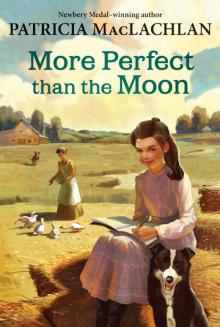 More Perfect Than the Moon
More Perfect Than the Moon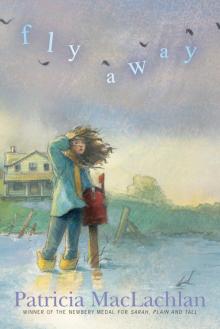 Fly Away
Fly Away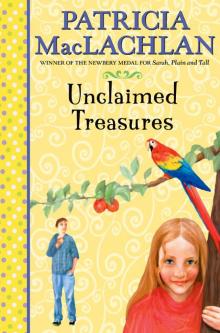 Unclaimed Treasures
Unclaimed Treasures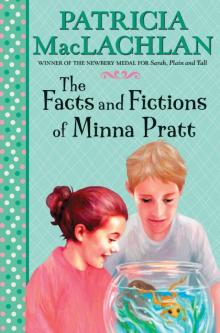 The Facts and Fictions of Minna Pratt
The Facts and Fictions of Minna Pratt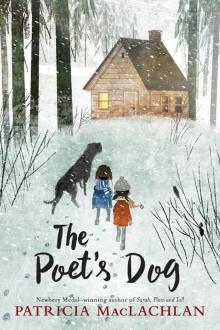 The Poet's Dog
The Poet's Dog Journey
Journey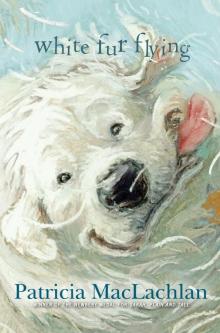 White Fur Flying
White Fur Flying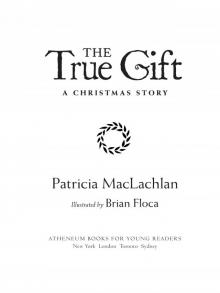 The True Gift: A Christmas Story
The True Gift: A Christmas Story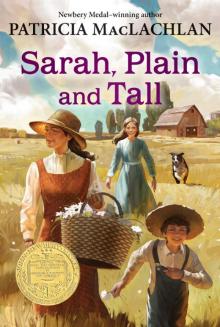 Sarah, Plain and Tall
Sarah, Plain and Tall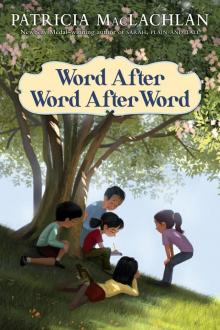 Word After Word After Word
Word After Word After Word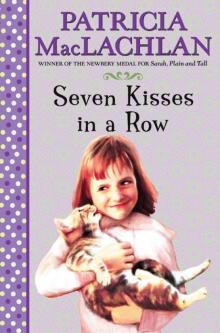 Seven Kisses in a Row
Seven Kisses in a Row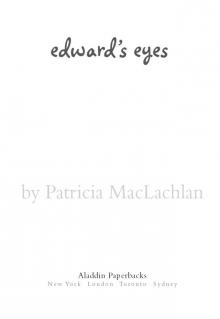 Edward's Eyes
Edward's Eyes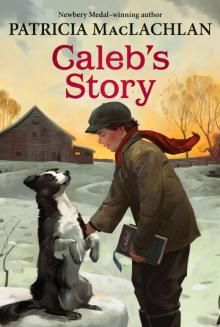 Caleb's Story
Caleb's Story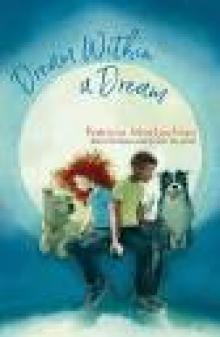 Dream Within a Dream
Dream Within a Dream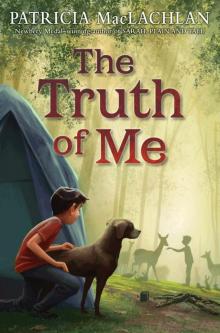 The Truth of Me
The Truth of Me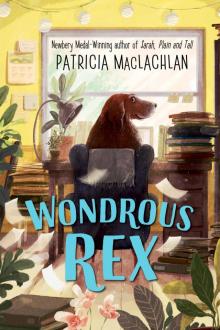 Wondrous Rex
Wondrous Rex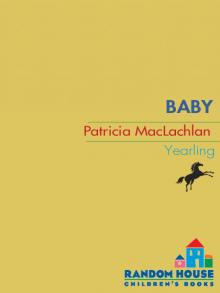 Baby
Baby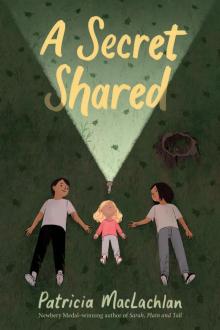 A Secret Shared
A Secret Shared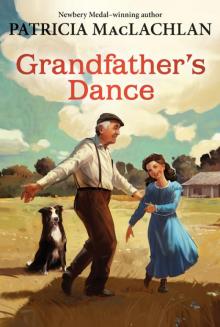 Grandfather's Dance
Grandfather's Dance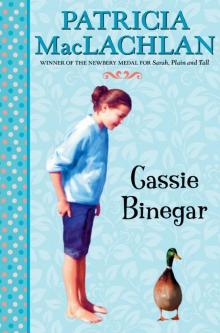 Cassie Binegar
Cassie Binegar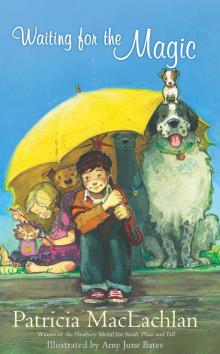 Waiting for the Magic
Waiting for the Magic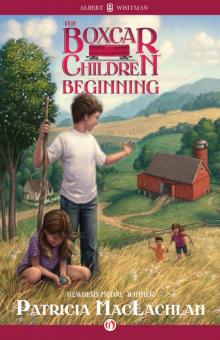 The Boxcar Children Beginning
The Boxcar Children Beginning My Father's Words
My Father's Words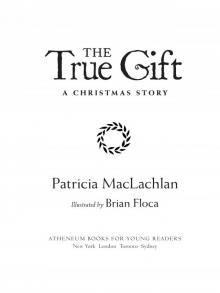 The True Gift
The True Gift